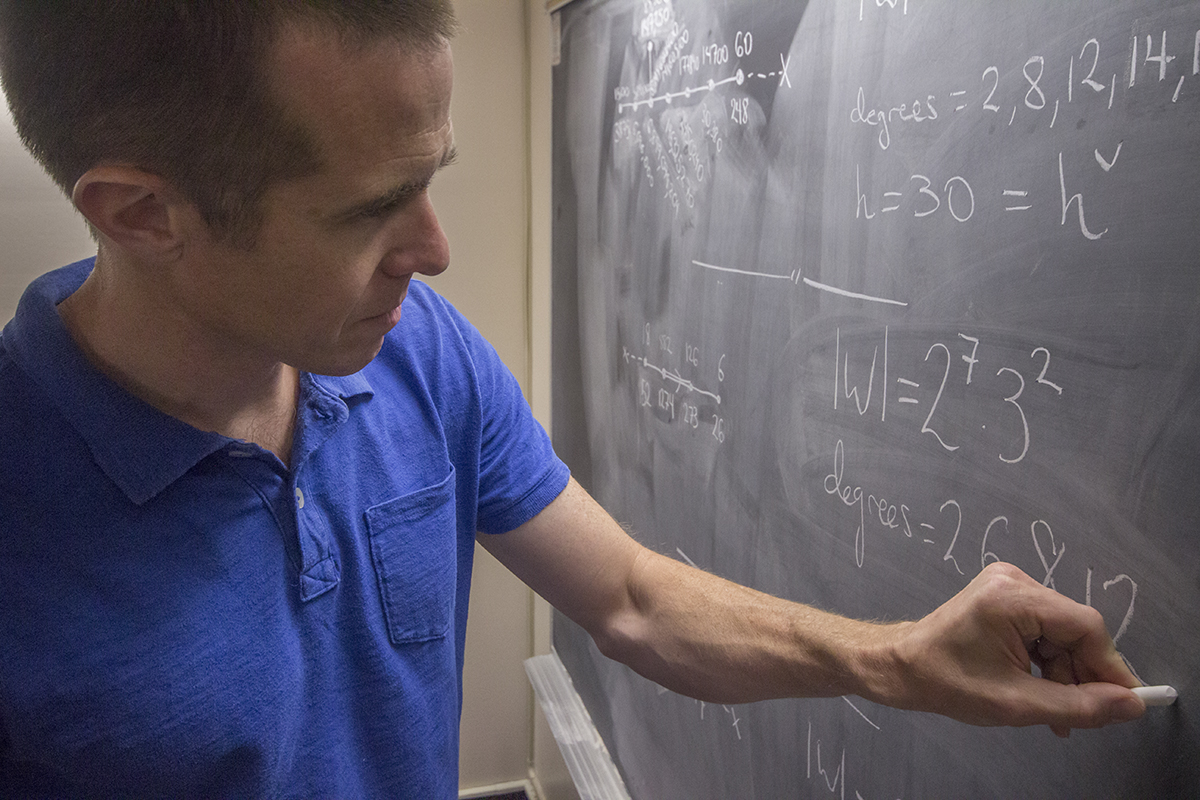Skip Garibaldi catches lottery scammers with mathematics

Skip Garibaldi, the associate director of the UCLA Institute for Pure and Applied Mathematics, uses his expertise to find lottery scammers. (Felicia Ramirez/Daily Bruin staff)
By Ariana Ricarte
May 20, 2014 4:19 a.m.
From the comfort of his desk in the UCLA mathematics department, Skip Garibaldi uses his analytical expertise to help find lottery scammers across the country.
Garibaldi, the associate director of the UCLA Institute for Pure and Applied Mathematics, uses probability and statistics to help investigators catch people who try to scam the lottery system. He said he hopes his work is a way that people can understand math’s role in everyday life.

He recently analyzed data on lottery winnings in Florida, which led to the suspension of 14 stores total in April and May that were suspected of illegal activity.
“It’s just a way I try to take seemingly random numbers and make them relevant in real-life applications,” Garibaldi said.
Russel Caflisch, director of the UCLA Institute for Pure and Applied Mathematics, said he thinks it is important to make math relevant to the real world in order to motivate students.
“A lot students think these math classes are just a filter to weed out the people who won’t get good grades, but some of these concepts are powerful and can be used in so many different ways,” Caflisch said.
Garibaldi’s interest in the math behind the lottery started as a side project. He contributed a chapter about the lottery to a book show that showcased science and math researchers and their various projects.
After the book was published, Garibaldi got a phone call from an investigative newspaper reporter who needed help analyzing a data set from the Florida lottery. The data included information about the top lottery winners, how frequently they won and the amount of winnings.
The reporter was suspicious that some of the numbers associated with the top winners were not normal, and he needed a lottery expert to confirm his findings, Garibaldi said.
A common method of lottery scamming is called ticket theft, which occurs when a clerk at a store tells someone that their ticket did not win, even though it did. The clerk then proceeds to pocket the money.
Garibaldi worked through the data set for a few months and figured out that there were people whose winnings looked too unrealistic.
For example, if data shows that a person spent $2.4 million on the lottery, that would mean that they needed to spend $1,000 a day for six years, Garibaldi said.
Soon after the newspaper article was published, several stores in the Florida area were banned from future lottery activity because of their suspected ticket theft.
“Before I started looking up the lottery, I never even knew these kinds of scams existed,” Garibaldi said. “I just think it’s a lot of fun.”
Garibaldi said that he had been interested in math during his academic career.
He finished his math courses early in high school and decided to drop out in order to apply to college during his sophomore year. He attended Purdue University as a computer science student, but soon added a math major because he said he realized he did not want to be confined to a basement lab for the rest of his career.
Garibaldi continued on to University of California, San Diego where he completed his doctorate in mathematics, while focusing on a concept known as algebraic groups, a form of abstract, linear algebra.
His interest in the lottery started because he and his colleagues realized that there were some concepts about the lottery that they did not have clear answers to.
For instance, they disagreed about how much money a person could get back from a lottery ticket depending on the game, and Garibaldi said he was curious to find a concrete answer.
Eventually, his work led to his appearances on TV shows “20/20” and “Fox and Friends” as a source to talk about the Mega Millions lottery.
Garibaldi said that the numbers from the Florida lottery project were easier to analyze because the investigative reporter had given him a large data pool.
He is currently working on a way to analyze lottery numbers if substantial data pools are not available.
He said it is often difficult to inspire people’s interest in math and make it relevant to everyday applications.
When he taught Math 3C: Probability for Life Sciences Students, a required probability and statistics class for many science students, he bought each student in the class a lottery ticket to make a point about the slim chance of winning. Although he had more than 100 students, none of them won.
In his free time, Garibaldi said he enjoys traditional outdoor climbing because of his love of the outdoors and its subtle connection to math. He has climbed more than 550 trails at Joshua Tree National Park.
“I find that a significantly large number of mathematicians and scientists also like climbing because I think there’s a problem-solving aspect of navigating a trail,” he said.
Ian Zemke, a mathematics graduate student, who also climbs with Garibaldi, said that similar to math, climbing is very sequential and people need to make specific decisions when figuring out how to navigate the path.
Aside from his administrative duties and consulting, Garibaldi is currently working on putting together a TV show about math.
“Although it can sometimes feel dry, with math you can feel accomplished because you realize you can solve something you never thought you could before,” Garibaldi said.


